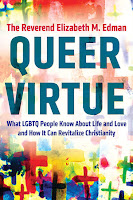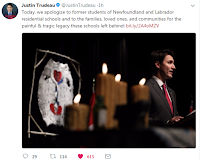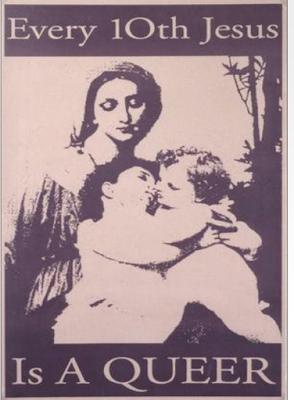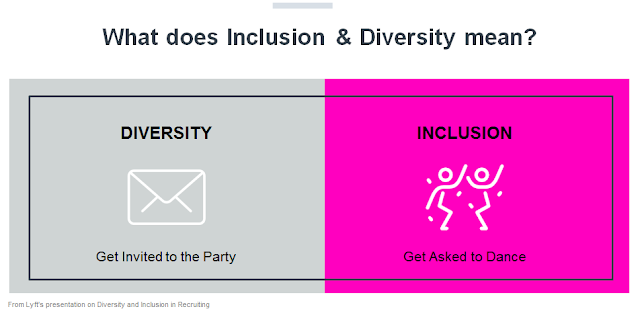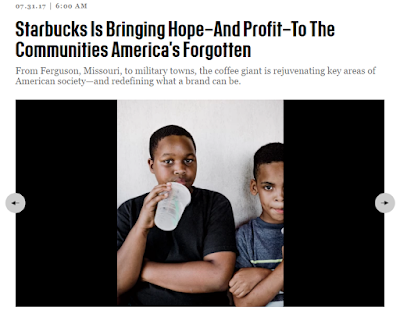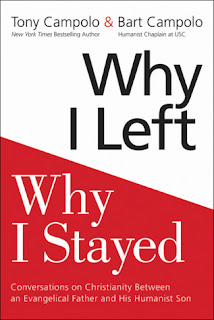Friday, December 15, 2017
Friday, December 08, 2017
[akkai padmashali's question and obama's answer...]
Direct link to video
Here's part of the conversation:
“How can I speak up in front of a society when I am a criminal under Section 377?” she [Akkai Padmashali, a transgender activist] asked.
“I think the answer is, it begins with what you just did, which is to find your voice and be able to articulate your views and your experiences, and tell your story,” Obama answered.
“And that’s true of any group that is marginalized, stigmatized,” he continued. “Finding that voice, and being able to tell a story so that the perceptions somehow that you are different are broken down, because they start seeing their experiences in you. They see your humanity.”
“Once that voice is there, hopefully others join you. So now you have networks, and organizations, and allies,” he said.
“And then, once that happens, it’s a matter of applying political pressure and being able to mobilize public opinion,” he instructed.
Read the whole article at:
https://www.lgbtqnation.com/2017/12/barack-obamas-inspirational-answer-question-trans-woman-will-give-hope/
categories:
lgbtq,
margins,
transgender
Wednesday, December 06, 2017
[queer virtue: what lgbtq people know about life and love...]
Queer Virtue: What LGBTQ People Know About Life and Love and How It Can Revitalize Christianity
The Reverend Elizabeth M. Edman.
Beacon Press, Boston MA 2016
Read more about this book, including praise, a sample chapter, and a free study guide at the publisher's webpage.
sample quotes
For Paul, love was the glue that holds a community together. But that love was never designed to be insular. Rather, the evangelistic impulse is precisely about expanding that sense of love outward both in proclamation and in service to the larger community. This was one of the significant ways that Christianity diverged from Judaism, becoming a community that transgresses ethnic ties, hoping to expand in scope and scale to include those in need throughout the world. (p. 25)
The path of queer virtue looks something like this:
One discerns an identity;
One risks telling oneself and others about that identity;
One engages with others, touches others, to explore that identity;
One confronts and is confronted by scandal;
One lives out one's identity with and through community, looking to the margins to see who is not yet included. (p. 27)
Wednesday, November 29, 2017
apologies from the prime minister and others
It's the month of apologies...
Today, we apologize to former students of Newfoundland and Labrador residential schools and to the families, loved ones, and communities for the painful & tragic legacy these schools left behind: https://t.co/BKatosyFfM pic.twitter.com/PsJ30Zr6zj— Justin Trudeau (@JustinTrudeau) November 24, 2017
LIVE NOW – Official apology in the House for the state-sponsored, systemic oppression, and rejection of LGBTQ2 people: https://t.co/55bmrnw6vZ— Justin Trudeau (@JustinTrudeau) November 28, 2017
Justin didn't mince any words with his apology. Note the detail in the apology, and the language used.
Text link to the full apology.
And coming sometime in the future...
P.S. Was Justin also apologizing on behalf of Christians?
categories:
indigenous,
jesus prays,
lgbtq
Monday, November 27, 2017
[voices of amiskwaciy and the seven sacred teachings]
Voices of Amiskwaciy is a new webspace that "supports the community to create, share, discover and celebrate local Indigenous content online. It is guided by the values of ongoing consultation and collaboration with Indigenous communities in the spirit of reconciliation, dialogue and learning.
Voices of Amiskwaciy is hosted by the Edmonton Public Library and made possible in part by the Government of Canada."
https://voicesofamiskwaciy.ca/
There are few stories available at this time (Nov 2017) as the site recently launched, but the project looks very promising especially in terms of its posture and collaboration.
In particular, I'm intrigued by the 7 Sacred Teachings that the site has adopted:
Love: Engaging in relationships from a place of kindness, caring and compassion and supporting of self-determination.
Respect: Creating a safe space where stories are valued.
Courage: Committing to follow through on project goals.
Honesty: Being transparent about the process and progress of the project to the public.
Wisdom: Seeking out and including Indigenous knowledge throughout the project development.
Humility: Working in meaningful partnerships on an equal plane and being open to learning and embracing new ways of understanding, acting and knowing.
Truth: Creating an authentic Indigenous space where truths can be shared. (source)
They remind me somewhat of the four core values used by Generous Space Ministries:
Humility – “Might I be wrong?”
Hospitality – “Whose voices are missing?”
Mutuality – “Is everyone in our community empowered to make a difference?”
Justice – “How can I participate with you in dismantling the barriers preventing flourishing?” (source)
These 7 Sacred Teachings could readily apply (with very little adaptation) to other contexts where the goal is a space that welcomes and embraces people.
categories:
indigenous
Tuesday, November 14, 2017
[positive spaces]
Positive Spaces address the issue that despite Canadian law which prohibits workplace discrimination and organizational policy which typically echoes the law and the Charter of Human Rights, many workplaces are still not welcoming places for LGBTQ2S+ employees.
Positive Space programs typically include some or all of the following:
- Training for staff
- Posters and stickers to reinforce the training and to increase awareness by staff, clients, and the public
- Positive Space champions - volunteers who "offer support, raise awareness, and wear and post identifiers to designate both themselves and their workspaces as safe."
- Review of procedures and documents to ensure they are LGBTQ+ positive and inclusive
Positive Spaces and similar programs are intended to result in a declared space (declared as being a positive, welcoming and affirming space for LGBTQ2S+ employees), persons who have declared themselves as allies / advocates / safe people to talk to, and overall increased awareness. LGBTQ Positive Spaces are being used by various organizations to promote safety and inclusion of LGBTQ+ employees and clients. Here are some examples:
categories:
diversity and inclusion,
embrace,
lgbtq
Wednesday, November 08, 2017
declared spaces inside declared spaces
This site has extensive discussion of uncertain spaces and declared spaces. Much of it has focused on the big declaring that a church can do in terms of how welcoming and embracing it is. The outward signs, and the many inward ways which make the declaration more than just words and empty gestures.
One of the ways a church or organization can declare itself further, which has not been discussed here yet, is by having specific declared spaces within a broader declared space. As will be seen in the following examples, some of these specific spaces are physical spaces; others are "spaces in time". As well, there are also ways for people within a church or organization to declare themselves...
declared "spaces in time" within declared spaces
These are defined declared spaces that happen at certain times, within a broader declared space. Here are some examples.
example 1: standing stones services
Several churches in our parish hold Standing Stones services once a month, in some cases during the regular Sunday morning service time.
"Standing Stones is a gathering of Aboriginal and Non-aboriginal People to explore God in an Aboriginal Context. We come to worship Jesus, infusing Cree symbols into Christian ceremony. We smudge to purify our minds, hearts and spirits in order to come to a clearer understanding of God; we seek wisdom in Aboriginal story and scripture, we ask for God’s healing water and prayer on ourselves and our community and we celebrate God’s activities in our lives though the sharing of bannock and berries. Standing Stones is a fresh expression of Jesus to the Aboriginal Community and to the diocese. The hope is that this gathering is a means of Christ’s reconciling Love to heal ancient wounds and enlighten the next generation of all Canadians."(source)
Monday, November 06, 2017
[the spirit of alex decoteau]
There's a new park near my office here in downtown Edmonton, named after Alex Decoteau, with a red sculpture by Pierre Poussin in the middle:
Esprit celebrates the spirit of Alex Decoteau. Alex Decoteau was a national hero with distinctions such as being Canada's first Indigenous police officer; World War I veteran; Olympic runner, and first inductee to Edmonton's Sports Hall of Fame. Composed of metal ribbons that intersect in fluidity, the sculpture stems from the silhouette of a man mid-sprint. Esprit strives to honour the achievements of a national hero and will serve as a landmark for the park, as well as for the greater Edmonton community. By choosing an abstract form, the artist aimed to render the artwork timeless and symbolic to as many people in the public as possible. (from the plaque)I love the way it flows freely against the backdrop of a government building in rigid concrete ...
The park is located at 105 Street NW and 102 Avenue NW, Edmonton.
categories:
embrace,
indigenous
Monday, October 30, 2017
[those of us who stand outside...]
"Those of us who stand outside the circle of this society’s definition of acceptable women; those of us who have been forged in the crucibles of difference – those of us who are poor, who are lesbians, who are Black, who are older – know that survival is not an academic skill. It is learning how to stand alone, unpopular and sometimes reviled, and how to make common cause with those others identified as outside the structures in order to define and seek a world in which we can all flourish. It is learning how to take our differences and make them strengths."
~ Audre Lorde
Monday, October 23, 2017
[Jim Fitterling makes the case for LGBTQ+ diversity and inclusion]
"Data suggests that about 75 percent of any organization’s LGBT population remain in the closet … because they’re too scared to come out. I know this from first-hand experience. I was one of those employees."Read the rest of his talk at https://www.vsotd.com/featured-speech/making-small-talk-case-lgbt-diversity-and-inclusion
"Employees who feel connected to the workplace—who feel free to speak their mind without fear of being “outed”—and who feel connected to their co-workers—are more engaged and feel more empowerment.
Ideas flow more genuinely. People trust one another more. Collaboration rises.
Did you know, by the way, that natural work groups perform cognitive tasks 32 percent better when LGBT team members are “out” as opposed to when they are closeted?"
categories:
diversity and inclusion,
embrace,
lgbtq
Wednesday, October 18, 2017
[naming ourselves: who defines Indigenous identity? article]
About identity and names and power....
Recent identifiers such as “Native American,” “Aboriginal,” and “Indigenous” are deceptively vague, attempting to contain all of the complexities and differences of each individual tribe under one umbrella term. The problem with such terms, of course, is that the bigger the group they attempt to represent, the more they erase complexities and differences and encourage homogenization. While grouping all Indigenous tribes and nations together can be convenient, the reason these terms became necessary in the first place is colonialism. Settler governments needed a term to differentiate us from the settler population (i.e., not indigenous to or claimed by a tribe indigenous to Turtle Island) to figure out how to exactly describe the problem we posed to their burgeoning nation-states. We could not be “The Hopitu-Oceti-Sakowin-Kanien’kehá:ka-Powhatan-Chahta-Annishnawbe-Beothuk, etc. problem.” We must be, simply, “The Indian problem.” Bearing that in mind, the question of how to define Native identity should always be split in two: how the government defines us and how we define ourselves.Read the rest of the article at: https://thewalrus.ca/we-didnt-choose-to-be-called-indigenous/
categories:
identity,
indigenous,
power
Tuesday, October 17, 2017
[OpenDyslexic typeface]
 OpenDyslexic is a new open source font created to increase readability for readers with dyslexia. The typeface includes regular, bold, italic, and bold-italic styles. It is being updated continually and improved based on input from dyslexic users. OpenDyslexic is free for Commercial and Personal use.
OpenDyslexic is a new open source font created to increase readability for readers with dyslexia. The typeface includes regular, bold, italic, and bold-italic styles. It is being updated continually and improved based on input from dyslexic users. OpenDyslexic is free for Commercial and Personal use.Available at: https://opendyslexic.org/
Note: there are some book readers which are being designed to allow the user to change various view settings, including font size, font type (the poeticcomputation example offers OpenDyslexic as one option), spacing between lines, and more.
https://www.fastcodesign.com/90144268/designing-a-book-that-fits-in-your-browser-window
http://poeticcomputation.info/ sample site where you can change font to this one, etc.
categories:
disability
Wednesday, October 11, 2017
[every 10th jesus...]
This poster is from the collection of the Center for the Study of Political Graphics.
The title alludes to Alfred Kinsey's work in the 1940s which found that 10% of men in the United States are homosexual. Despite there being significant methodological reasons that this number should not be applied to the general population, the number "10%" has stuck.
From the details page:
By incorporating this statistic into Bouguereau’s traditional religious portrait, Handel challenges the understanding of Christian views on homosexuality. Bouguereau’s idyllic depiction of the affectionate infants Jesus and John the Baptist in the loving embrace of the Virgin Mary evoke Christ's and Mary's love and compassion for all humanity, including the ten percent who may be gay or lesbian. The peacefulness of the scene emphasizes the stark contrast between the great benevolence and love expressed by Christ in the Bible and the hatred and violence directed towards the LGBT community that some attempt to justify with Christian ideology.
Tuesday, October 10, 2017
[answering messages of hate with love]
Here's an innovative and constructive way to deal with racist graffiti:
Ibo Omari has a plan for when he comes across a swastika painted onto a wall in his hometown of Berlin. He’ll grab a can of spray paint from the graffiti supply shop that he owns, and cover it up. But Omari doesn’t just erase the Nazi trademark—he transforms it.
Since launching Berlin #PaintBack earlier this year, Omari and his fellow organizers have covered up at least 20 swastikas across Berlin, leaving an array of whimsical street art where symbols of hate were once visible.
Read more about how #PaintBack is transforming neo-nazi graffiti into whimsical street art.
https://www.citylab.com/life/2016/08/transforming-neo-nazi-graffiti-into-whimsical-street-art/497867/
Here's a Canadian story where a church in Waterloo did something quite similar.
Thursday, October 05, 2017
[what does inclusion and diversity mean?]
I've been keeping an eye out recently for catchy ways of explaining diversity and inclusion, especially in ways that make the distinction clear, and came across this graphic in a presentation by Lyft.
But it begs other questions: Can you dance with whom you wish at this party? Will anyone whisper about you behind your back or jeer at you openly?
Can you be authentic and free to be the person you are without fear?
And here's another set of questioning: who controls the music that is played? whose styles of dance are acceptable?
It's one thing to be invited to someone else's party and to be asked to dance their dances... but is that inclusion? Or is inclusion having a variety of music that reflects everyone's interests and cultures, and enjoying and learning from each other?
Wednesday, September 27, 2017
[canada and lgbtq+ employees]
As we generally all know:
“... Canada’s LGBTQ populations have implied protection under Section 15 of the Charter. The Canadian Human Rights Act protects LGBTQ employees from employment discrimination; Bill C-16 … was put forth by the sitting Liberal government to update the act to include the terms ‘gender identity’ and ‘gender expression.’”
Then, there’s this news (not surprising, but let's spell it out):
“A recent study by Telus found that one third of the 814 respondents (half of whom identified as LGBTQ) did not find their workplaces safe and inclusive for lesbian and gay employees; 45 per cent said the same for trans workers. Nearly a third of respondents said they had experienced or witnessed homophobic or transphobic discrimination or harassment at work -- with fewer than 40 per cent of these incidents reported to employers.”
Clearly, not an environment to flourish in.
As well, some minority groups are acknowledged and others are not. For example, in some workplaces, there are Aboriginal Day events and Anti-Bullying events, but nothing official is done internally to recognize Pride week. What does it say about you and the group you are part of, when you are left out of celebrations? Is that a favourable environment in which to flourish?
Source of quotes: Pride Guide by Susan Goldberg
http://www.corporateknights.com/magazines/2017-best-50-issue/pride-guide-14961924/
“... Canada’s LGBTQ populations have implied protection under Section 15 of the Charter. The Canadian Human Rights Act protects LGBTQ employees from employment discrimination; Bill C-16 … was put forth by the sitting Liberal government to update the act to include the terms ‘gender identity’ and ‘gender expression.’”
Then, there’s this news (not surprising, but let's spell it out):
“A recent study by Telus found that one third of the 814 respondents (half of whom identified as LGBTQ) did not find their workplaces safe and inclusive for lesbian and gay employees; 45 per cent said the same for trans workers. Nearly a third of respondents said they had experienced or witnessed homophobic or transphobic discrimination or harassment at work -- with fewer than 40 per cent of these incidents reported to employers.”
Clearly, not an environment to flourish in.
As well, some minority groups are acknowledged and others are not. For example, in some workplaces, there are Aboriginal Day events and Anti-Bullying events, but nothing official is done internally to recognize Pride week. What does it say about you and the group you are part of, when you are left out of celebrations? Is that a favourable environment in which to flourish?
Source of quotes: Pride Guide by Susan Goldberg
http://www.corporateknights.com/magazines/2017-best-50-issue/pride-guide-14961924/
[co-posted on September 18, 2017]
categories:
bullying,
exclusion,
flourish,
human rights,
lgbtq
Wednesday, September 20, 2017
flourishing: an introduction
Much is said these days about diversity and inclusion. Diversity, of course, is about numbers and percentages, about homogeneity and heterogeneity, but is no guarantee of good relations. A jungle has a diversity of wildlife, but that doesn’t change the fact that there is a food chain and that some kinds of animals eat other kinds of animals who in turn eat other kinds of animals. That’s not the kind of world we want.
Inclusion has to do with people being included and respected. As Royal Bank put it on their D&I page, “In simple terms, diversity is the mix; inclusion is getting the mix to work well together.” However, inclusion can potentially be perceived in other ways, such as the idea of including someone within an existing structure which remains unchanged or, in the case of the Borg, assimilation into the collective. Some people also add the concepts of justice and equity, to address the more systemic problems that are experienced by many people who belong to minorities.
Flourishing is like diversity and inclusion and justice and equity all together on steroids.
[co-posted on September 13, 2017]
Friday, August 25, 2017
[jasper diversity project]

I came across this diversity project while on vacation in Jasper. Banners featuring various Jasper residents, and some with sayings, hang on the street lights along the main shopping street. Here is how their website describes it:
"You're different? That's awesome. You're just like the rest of us!
The Jasper Community Team's Diversity Project showcases the value that Jasper's unique peoplescape brings to the community. The Diversity Project reveals the beauty in Jasper's human surroundings - something that can easily be overlooked in a place that is constantly on display for its world renowned natural landscape."
What I really appreciate about this project is ... how diverse it is! The people on the poster and the street signs represent a wide range of community members and a broad range of differences.
Along with sayings like the one seen in the picture below, people hold up signs about themselves. The poster to the left gives some examples; the signs on the street have more:

- I love my freckles
- Drama king!
- Proud to be brown!!
- Nous parlons francais
- Proud to be newlyweds!
- I'm proud to be native!
- We are blessed to be in a blended family
- I love being Christian
- I love being gay
- Winning my battle with depression
Wednesday, August 16, 2017
[the dream we form by being together]
"As part of Canada’s 150th year, the Borealis Gallery opens The Dream We Form By Being Together. This exhibition centres on the theme of reconciliation and emerges from the awareness that art can play a central role in the process. Drawing from indigenous practices and understandings, the show seeks to rebalance colonial narratives within the much larger story of this place we now call Canada."
The exhibit runs until October 1, 2017. If you are in or near Edmonton, check it out!
More info
categories:
embrace,
indigenous,
reconciliation
Monday, August 14, 2017
[there's something wrong with the village...]
They say it takes a village to raise a child... but sometimes, there's something wrong with the village:
Watch directly on YouTube
Background info on video
categories:
embrace,
exclusion,
identity,
transgender
Wednesday, August 02, 2017
[starbucks as social assistor]
Here's a very interesting article I came across on Fast Company, about Starbucks opening locations in struggling communities as well as military towns, and being intentional about hiring, training, and promoting local people.
My initial reaction is to be skeptical -- after all, big corporations are only interested in profit and the bottom line. However, while obviously these stores do have to be profitable, it does seem that they are serious about making a difference.
On a related note, and I say this as someone who works in government, it's quite amazing to see the serious targets they set and how they reach many of them early...
Read the whole article yourself, and comment below!
Friday, June 09, 2017
[open your world]
So Heineken put together an interesting ad about getting people with very different views and beliefs to interact and see each other as human beings.
Watch on YouTube.
What if your church did something like this? How might that help the members learn how to relate to people who have different beliefs and behaviours than they are used to?
...
Why should a church even have to do such a complicated thing to help people to get along with one another? Shouldn't the life of Jesus as we see in the Gospels inform us and change us?
Or we could look at it like this: the church is full of all sorts of people. On our journey of following Jesus and becoming more like him, wouldn't it be reasonable and right for the church to be helping people with all aspects of that? Including how to better love one another? How to see all people as well-loved by God?
Perhaps it's time to try some innovative ways to break through our prejudices...
Huffington Post article on this ad
humanlibrary.org is the organization that Heineken worked with to create this ad.
"A Worldwide Movement for Social Change
Don't Judge a Book by Its Cover
The Human Library™ is designed to build a positive framework for conversations that can challenge stereotypes and prejudices through dialogue.
The Human Library is a place where real people are on loan to readers.
A place where difficult questions are expected, appreciated and answered."
Friday, May 12, 2017
bread, stones and parents
We give sons & daughters a serpent instead of a fish, a stone instead of bread. They leave-we say it's due to "cultural relativism."— Jonathan Martin (@theboyonthebike) April 20, 2017
Which daughters and sons are being given stones and serpents?
Which daughters and sons are being stoned
instead of fed and nourished?
Matthew 7:9-11 (NIV)
“Which of you, if your son asks for bread, will give him a stone? Or if he asks for a fish, will give him a snake? If you, then, though you are evil, know how to give good gifts to your children, how much more will your Father in heaven give good gifts to those who ask him!
Luke 11:11 (NIV)
“So I say to you: Ask and it will be given to you; seek and you will find; knock and the door will be opened to you. For everyone who asks receives; the one who seeks finds; and to the one who knocks, the door will be opened.
“Which of you fathers, if your son asks for[a] a fish, will give him a snake instead? Or if he asks for an egg, will give him a scorpion?
categories:
jesus prays,
love
Wednesday, May 03, 2017
[why i left, why i stayed: book]
In Why I Left, Why I Stayed, Tony, a renowned Christian teacher and apologist, and Bart, a humanist chaplain at the University of Southern California, seek to provide a safe space for anyone wrestling with their own—or a loved one’s—decision to stay in or leave the church, providing compelling arguments in both directions and modeling for everyone how to strongly but lovingly disagree about the things that matter most.
For anyone who has questions about the viability and truth of the Christian life or wonders what life looks like after Christianity, this book promises to be challenging, inspiring, and highly informative. Read a sneak peek excerpt here.
(Source: Red Letter Christians email)
I haven't read this book, but it looks like a great example of how people with very different views can get along and, in fact, like and love each other as people.
Click here to watch on YouTube.
Thursday, April 20, 2017
disco spirit
Oh look! Jesus' prayer has come true at St. Mark's in the Bowery (NYC):
image source
Try suggesting this to your church council...
categories:
jesus prays,
lgbtq
Sunday, April 16, 2017
[happy easter!]
Black Jesus from Coptic Church in Egypt. Happy Easter. pic.twitter.com/HD9p9hN2zM— Khaled Beydoun (@KhaledBeydoun) April 16, 2017
categories:
jesus
Friday, March 17, 2017
[heathens and the church]
Really love the song Heathens by twenty one pilots, and then found that Richard Beck, one of my favourite bloggers and authors, has just written about them in his blog. Here's a snippet of what he says:
"Heathens" makes many of the points I try to make in Unclean. The speaker and audience of "Heathens" is unclear, but I'd like to read the song as Jesus speaking to the church, as TØP preaching to their fellow Christians. Read this way "Heathens" is both a prophetic rebuke to the church as well as an invitation into Jesus' lifestyle of radical hospitality.
Read the entire post:
Lovin' On the Freakshow Sitting Next to You: The Church According to Twenty One Pilots
If you haven't heard the song, you can hear it in this video. Note that as the song was used for a movie soundtrack, the images in this video are not related to what Richard Beck is speaking about!
Watch on YouTube.
Lyrics:
All my friends are heathens. Take it slow
Wait for them to ask you who you know
Please don't make any sudden moves
You don't know the half of the abuse
All my friends are heathens. Take it slow
Wait for them to ask you who you know
Please don't make any sudden moves
You don't know the half of the abuse
categories:
embrace,
hospitality,
margins,
quotes from beck
Tuesday, February 28, 2017
[evergreen presbyterian declares itself]
I came across this image in an article by Mary Button, Mission Developer at Evergreen Presbyterian Church, in Memphis. The article itself is worth reading, as it talks about how she and the church respond in open ways to what is happening around them.
Give it a read: Art as Resistance in Uncertain Times.
Love the way the church windows, being located in a store front, are right at the street level. No fences and manicured lawns between passersby and this building. There are the windows, and on them this church has declared what they are about.
Wednesday, February 22, 2017
Wednesday, January 25, 2017
Friday, January 20, 2017
[fishing tips, from rev. dr. john pentland]
 "Fishing Tips is an open invitation to be curious. Using an ancient story as inspiration, John Pentland reflects on how Hillhurst United said "Yes" to throwing the nets on the other side of convention. The result was innovative, invigorating and transformative."
"Fishing Tips is an open invitation to be curious. Using an ancient story as inspiration, John Pentland reflects on how Hillhurst United said "Yes" to throwing the nets on the other side of convention. The result was innovative, invigorating and transformative."In the 1980s, Hillhurst United opposed the ordination of gay and lesbian people. Today, they are an affirming congregation. This book is by the minister who played a key role in this transformation.
Of particular interest to the topic of uncertain spaces and declared spaces is Fishing Tip Eight: Say Who You Are. This chapter has two parts: Naming Ourselves, and How a Name Leads to Action & Grows Your Church
For more on the book, click here: http://www.hillhurstunited.com/fishing-tips
Check out an article that discusses if a church can be biblical, evangelical and progressive.
Thursday, January 12, 2017
[PIE: public, intentional, explicit]
Most congregations do their best to be welcoming, but being affirming goes deeper and is public, intentional, and explicit, in their commitment to diversity and inclusion.
Think “PIE”: Public, Intentional, and Explicit.
Public: An Affirming Ministry uses symbols and signs which are echoed outside and inside the church building, in worship, and in all other facets of church life. The broader community should also know what it stands for; a witness to the wider community that God’s love extends to everyone equally and without reserve. This is still a radical message!
Intentional: An Affirming Ministry is deliberate in their process of study, education and dialogue with members of their faith community (both during the Affirming process and as a piece of their ongoing work), to ensure that the history of oppression and discrimination by the Church is both understood and acknowledged, and that continued growth, education, and celebration are part of its ministry.
Explicit: Affirming Ministries should explicitly indicate in their Mission and Vision statement – and everywhere else! – that the LGBTQ+ community is a part of and embraced in all facets of church life. And as part of the Affirming process, their faith community will explore and explain how to live out that commitment.
Read more about this at
http://affirmunited.ause.ca/frequently-asked-questions-about-affirm-united-saffirmer-ensemble/
Tuesday, January 10, 2017
[can a church be biblical, evangelical and progressive?]
Here's an article about a Calgary church that believes in Jesus and loves and embraces people -- in reality, not just abstractly.
Can a church be both open and inclusive on social questions and at the same time evangelical in outreach and committed to scripture and doctrine? Wouldn’t you want to be part of a church like that?
It is not hard to find theologically open churches that aren’t engaged with scripture and doctrine. And it is easy to find churches committed to scripture and doctrine that make the lines of belonging impossibly narrow. Could a church offer the best of both worlds?
John Pentland, minister at Hillhurst United Church in Calgary, Alberta, thinks so, and his church seems poised to reach a generation of Canadians who are skeptical of religion in general and Christianity in particular. He admits that this is surprising—those looking for innovative congregations and dramatic church growth are not likely to look at the United Church of Canada.
"Biblical, evangelical—and progressive" by Jason ByasseeOct 28, 2016
Click here to read the rest of the article.
p.s. this post is tagged with "uncertain spaces" because Hillhurst is the opposite of an uncertain space — it is a great example of a declared space.
Friday, January 06, 2017
why I no longer believe in lgbtq+ friendly churches
I used to be in favour of lgbtq+ friendly churches.
My denomination, according to head office, has at least four lgbtq-friendly churches in this area1. Generally, these churches are welcoming of people regardless of sexual orientation or gender identity, allow involvement in ministry at all levels and have pastors who are theologically progressive.
Despite being lgbtq-friendly, these churches are uncertain spaces to many people, in that they have not declared if and how they value and embrace diverse peoples. To be specific in this context, these churches do not say anything about being lgbtq+ friendly, their website gives no indication of their welcome and there are no rainbows on the sign out front. The effect is that people in the neighbourhood and, in fact, even people inside the church itself, might have no idea.
And so initially I had thought that they needed encouragement to move toward becoming churches that openly declare that all people are welcome and valued. This is particularly important so that people who are at the edges and who belong to minority groups would know which churches will walk with them on their spiritual journey.
That's what I used to think. But now, I no longer believe in lgbtq+ friendly churches.
It’s not because they are hesitant to proclaim that the good news they believe truly includes everyone. It’s because just as lgbtq+ friendliness is absent from the signs and the website, so are all things lgbtq+ absent from the culture and structure of the church.
Subscribe to:
Comments (Atom)



